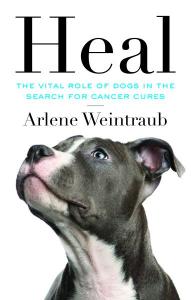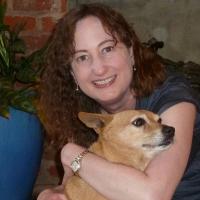Arlene Weintraub: Heal
IN THE SEARCH FOR CANCER CURES
Arlene Weintraub
ECW Press, October 1, 2015, $16.95
ISBN:9781770412705
Weintraub writes:
In 2010, I lost my sister, Beth, to gastric cancer. She was 47 when she succumbed to the disease, after a painful and fruitless year of chemotherapy and surgery.
At the time, I was working on staff at BusinessWeek magazine as a senior science reporter. One day two veterinarians from Texas A&M University came to my office to publicize their new, state-of-the-art cancer center, which was designed to find new cures, not just for pets, but for people, too. I was surprised to learn that dogs get many of the same cancers that strike people, including lymphoma, melanoma, breast cancer, bone cancer, and even gastric cancer.
As I sat there, silently stewing in my private grief, I wondered: could dogs — the beloved companions who brought so much joy to so many families, including my own — be the key to solving the endless puzzle of this horrific disease?That was the impetus for Heal, a popular science book that examines the many ways pet dogs are helping in the fight against cancer. Each chapter focuses on a different type of cancer, bringing to life the dogs — and, in one chapter, cats — who are participating in clinical trials of new treatments and devices for early detection at more than a half-dozen veterinary schools I visited.
The resolution of the book comes when I visit a veterinarian at Tufts University who is collecting tumor samples from dogs with gastric cancer and using them to search for genomic clues to the disease — gene mutations or other biomarkers that could lead to new targeted therapies for both dogs and people.
The publisher of my first book dropped its option for a second book. Finding a new publisher wasn’t easy, especially in the early stages, when I purposely left my personal experience with cancer out of the story, and kept my voice out of it entirely. That was a mistake. Fact is, as I dealt with the grief of losing my sister, I found the process of meeting all those dogs, as well as their owners and veterinarians, therapeutic and inspiring. Narrating the book through that lens turned out to be an ideal way to structure the story.
I worked hard to get that sense of renewal across in the proposal, and, ultimately, in the finished book. I believe that willingness to show my emotional connection to the topic is what ultimately sealed the deal.
Contact info:
- Arlene Weintraub: 201-683-8006, arlene.weintraub@gmail.com
- Agent: Renee Zuckerbrot, 212-967-0072, renee@rzagency.com
- Publicist: Jenna Illies, 416-694-3348, jenna@ecwpress.com
- Book website: www.ecwpress.com/heal
- Book blog: www.healdogsandcancer.com
NASW members: will your book be published soon? Take advantage of this opportunity for shameless self-promotion.
Tell your fellow NASW members how you came up with the idea for your book, developed a proposal, found an agent and publisher, funded and conducted research, and put the book together. Include what you wish you had known before you started this project, or had done differently.
See https://www.nasw.org/advance-copy-submission-guidelines.
Send info and images to Lynne Lamberg, NASW book editor, llamberg@nasw.org.





